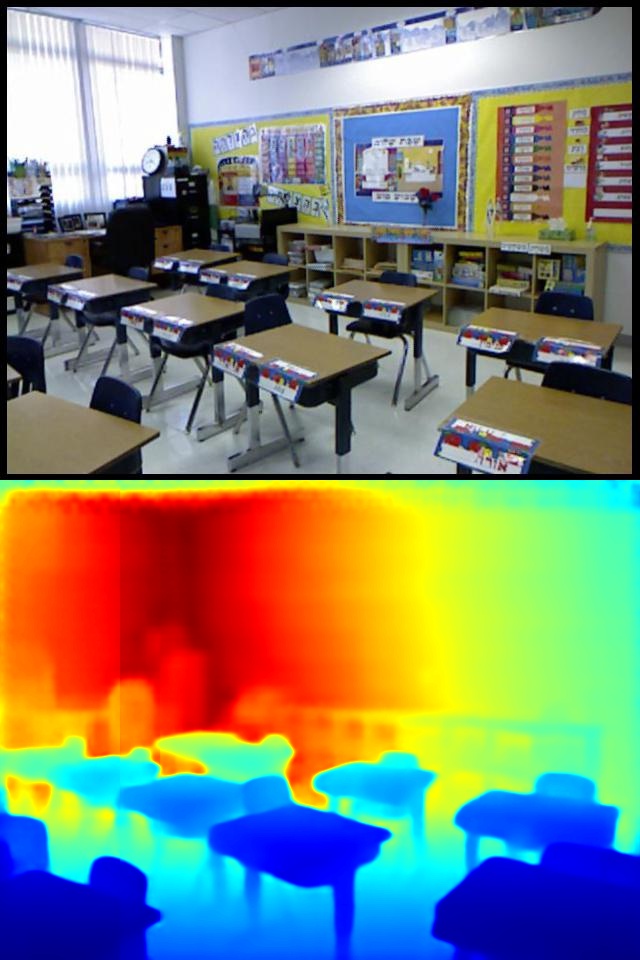mirror of
https://github.com/open-mmlab/mmsegmentation.git
synced 2025-06-03 22:03:48 +08:00
Thanks for your contribution and we appreciate it a lot. The following instructions would make your pull request more healthy and more easily get feedback. If you do not understand some items, don't worry, just make the pull request and seek help from maintainers. ## Motivation Support inference and visualization of VPD ## Modification 1. add a new VPD model that does not generate black border in predictions 2. update `SegLocalVisualizer` to support depth visualization 3. update `MMSegInferencer` to support save predictions of depth estimation in method `postprocess` ## BC-breaking (Optional) Does the modification introduce changes that break the backward-compatibility of the downstream repos? If so, please describe how it breaks the compatibility and how the downstream projects should modify their code to keep compatibility with this PR. ## Use cases (Optional) Run inference with VPD using the this command ```sh python demo/image_demo_with_inferencer.py demo/classroom__rgb_00283.jpg vpd_depth --out-dir vis_results ``` The following image will be saved under `vis_results/vis`  ## Checklist 1. Pre-commit or other linting tools are used to fix the potential lint issues. 4. The modification is covered by complete unit tests. If not, please add more unit test to ensure the correctness. 5. If the modification has potential influence on downstream projects, this PR should be tested with downstream projects, like MMDet or MMDet3D. 6. The documentation has been modified accordingly, like docstring or example tutorials.
123 lines
3.8 KiB
Python
123 lines
3.8 KiB
Python
# Copyright (c) OpenMMLab. All rights reserved.
|
|
from typing import Optional, Union
|
|
|
|
import torch
|
|
import torch.nn as nn
|
|
from torch import Tensor
|
|
|
|
from mmseg.registry import MODELS
|
|
from .utils import weight_reduce_loss
|
|
|
|
|
|
def silog_loss(pred: Tensor,
|
|
target: Tensor,
|
|
weight: Optional[Tensor] = None,
|
|
eps: float = 1e-4,
|
|
reduction: Union[str, None] = 'mean',
|
|
avg_factor: Optional[int] = None) -> Tensor:
|
|
"""Computes the Scale-Invariant Logarithmic (SI-Log) loss between
|
|
prediction and target.
|
|
|
|
Args:
|
|
pred (Tensor): Predicted output.
|
|
target (Tensor): Ground truth.
|
|
weight (Optional[Tensor]): Optional weight to apply on the loss.
|
|
eps (float): Epsilon value to avoid division and log(0).
|
|
reduction (Union[str, None]): Specifies the reduction to apply to the
|
|
output: 'mean', 'sum' or None.
|
|
avg_factor (Optional[int]): Optional average factor for the loss.
|
|
|
|
Returns:
|
|
Tensor: The calculated SI-Log loss.
|
|
"""
|
|
pred, target = pred.flatten(1), target.flatten(1)
|
|
valid_mask = (target > eps).detach().float()
|
|
|
|
diff_log = torch.log(target.clamp(min=eps)) - torch.log(
|
|
pred.clamp(min=eps))
|
|
|
|
valid_mask = (target > eps).detach() & (~torch.isnan(diff_log))
|
|
diff_log[~valid_mask] = 0.0
|
|
valid_mask = valid_mask.float()
|
|
|
|
diff_log_sq_mean = (diff_log.pow(2) * valid_mask).sum(
|
|
dim=1) / valid_mask.sum(dim=1).clamp(min=eps)
|
|
diff_log_mean = (diff_log * valid_mask).sum(dim=1) / valid_mask.sum(
|
|
dim=1).clamp(min=eps)
|
|
|
|
loss = torch.sqrt(diff_log_sq_mean - 0.5 * diff_log_mean.pow(2))
|
|
|
|
if weight is not None:
|
|
weight = weight.float()
|
|
|
|
loss = weight_reduce_loss(loss, weight, reduction, avg_factor)
|
|
return loss
|
|
|
|
|
|
@MODELS.register_module()
|
|
class SiLogLoss(nn.Module):
|
|
"""Compute SiLog loss.
|
|
|
|
Args:
|
|
reduction (str, optional): The method used
|
|
to reduce the loss. Options are "none",
|
|
"mean" and "sum". Defaults to 'mean'.
|
|
loss_weight (float, optional): Weight of loss. Defaults to 1.0.
|
|
eps (float): Avoid dividing by zero. Defaults to 1e-3.
|
|
loss_name (str, optional): Name of the loss item. If you want this
|
|
loss item to be included into the backward graph, `loss_` must
|
|
be the prefix of the name. Defaults to 'loss_silog'.
|
|
"""
|
|
|
|
def __init__(self,
|
|
reduction='mean',
|
|
loss_weight=1.0,
|
|
eps=1e-6,
|
|
loss_name='loss_silog'):
|
|
super().__init__()
|
|
self.reduction = reduction
|
|
self.loss_weight = loss_weight
|
|
self.eps = eps
|
|
self._loss_name = loss_name
|
|
|
|
def forward(
|
|
self,
|
|
pred,
|
|
target,
|
|
weight=None,
|
|
avg_factor=None,
|
|
reduction_override=None,
|
|
):
|
|
|
|
assert pred.shape == target.shape, 'the shapes of pred ' \
|
|
f'({pred.shape}) and target ({target.shape}) are mismatch'
|
|
|
|
assert reduction_override in (None, 'none', 'mean', 'sum')
|
|
reduction = (
|
|
reduction_override if reduction_override else self.reduction)
|
|
|
|
loss = self.loss_weight * silog_loss(
|
|
pred,
|
|
target,
|
|
weight,
|
|
eps=self.eps,
|
|
reduction=reduction,
|
|
avg_factor=avg_factor,
|
|
)
|
|
|
|
return loss
|
|
|
|
@property
|
|
def loss_name(self):
|
|
"""Loss Name.
|
|
|
|
This function must be implemented and will return the name of this
|
|
loss function. This name will be used to combine different loss items
|
|
by simple sum operation. In addition, if you want this loss item to be
|
|
included into the backward graph, `loss_` must be the prefix of the
|
|
name.
|
|
Returns:
|
|
str: The name of this loss item.
|
|
"""
|
|
return self._loss_name
|